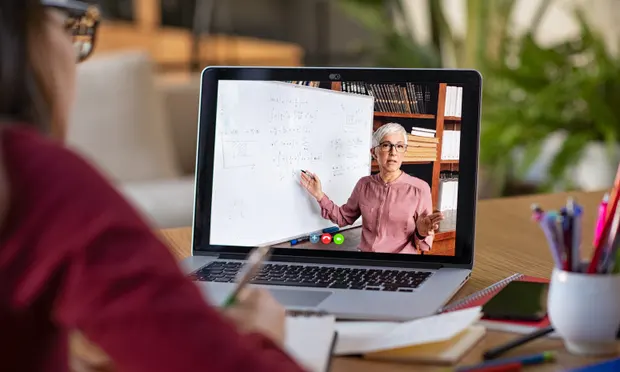THE FUTURE OF ONLINE LEARNING
The future of online learning: the long-term trends accelerated by Covid-19
With the technology now available, it’s clear that simply broadcasting pre-recorded lectures is no longer an option for forward-thinking universities. Some universities have moved virtually all of their assessments and exams online For Prof John Domingue, director of the Open University’s pioneering research and development lab, the Knowledge Media Institute (KMI), the “online genie” is out of the bottle and won’t go back in.
“It’s slightly galling to see some universities trying to replicate online almost exactly what they delivered face-to-face before Covid. Standing before a camera and broadcasting is not online teaching. You need to do things differently,” he says.
So what can universities undertake to make online learning more than just a heavy focus on streaming and recording technology? Domingue points to artificial intelligence (AI) and the concept of an online library for educators based on a Google search engine dedicated to education, and a Netflix-style recommendation tool that tracks down content to suit a lecturer’s own field, based on previous searches.
KMI is currently developing a personalised AI assistant or chatbot, an AI career coach and other tools that can analyse essays for marking and set up quizzes on revision topics.
Personalisation is also key to giving students and lecturers a better online experience. In 2017, Oxford’s Saïd Business School installed the first immersive virtual classroom of its kind in the UK: a bank of 27 HD screens able to simultaneously support up to 84 students from across the globe, called the Oxford Hub for International Virtual Education (or HIVE). An in-room camera follows lecturers moving around the room, who can respond – as in real life – to visual cues from and talk directly to individual students.
While such technology could be prohibitively expensive for many institutions, Duncan Peberdy, a consultant specialising in tech-enabled learning spaces and former adviser at the educational IT body, Jisc, says a much cheaper alternative in the form of a 3-4m wide screen offering a different dynamic based on simplified specifications has been developed by ViewSonic. “We are now in talks with two UK universities to jointly develop it on their campuses,” he says.
Meanwhile on UK campuses, many universities are striving to make the online experience more than just a lecturer broadcasting in front of a camera.
“We didn’t want that approach so we ‘shifted’ academics who were simply recurating their material with PowerPoint slides and brought in new hardware and specialists to assist them,” says Guy Daly, deputy vice-chancellor (education and students) at Coventry University.
“We realized our academics either needed the skills or support to deliver online learning in a very engaging way in a now very different world. Since March, we’ve repurposed 2,500 course modules at under- and postgraduate level for delivery in the first term of this academic year.”
Coventry has moved virtually all its student assessments and exams online. “We also used to talk about the death of the traditional lecture and bringing in more student activity-based learning as opposed to traditional didactic methods, but we’ve accelerated that journey due to Covid,” says Daly.
Wholesale and now permanent changes have gone hand in hand with the launches of Coventry’s first online postgraduate certificate in education and the first online nursing degree in England.
Many taught postgrad students, particularly those using labs, have been among students hardest hit, according to Prof Danielle George, associate dean for teaching and learning at the University of Manchester. “They only have one year to ensure they receive all their intended learning outcomes from their course. So we’ve invested in software to enable them to do prep work at home so they will then need less time in the lab itself,” she says.
“We have also helped them with time management, which is absolutely key [during short courses]. Covid took away their daily structure of going from room to room on campus so we’ve timetabled asynchronous activities – their lecturer will, say, be available ‘live’ at 9am to deliver a lecture and then answer questions, or they can choose to watch a recorded version later in their own time.
“My best advice to postgrads is to get involved in anything to do with induction – we’ve invested a lot more energy, time and passion in this area than we’ve done before and put on numerous practical online sessions,” says George.


